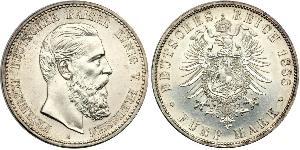2 Mark Kingdom of Prussia (1701-1918) Silver Frederick III, Germa ...
1888, Germany (Empire), Frederick III of Prussia. Silver 2 Mark Coin.
Mint Date: 1888
Mint Place: Berlin (A)
Denomination: 2 Mark
Reference: KM-510, Jaeger 98.
Weight: 11,06gm
Diameter: 28mm
Material: Silver
Obverse: Bust of Frederick III of Prussia as German Emperor right.
Legend: FRIEDRICH DEUTSCHER KAISER KÖNIG V. PREUSSEN / A
Reverse: Crown of the German Empire above heraldic eagle of Germany with prussian shield at chest and iron star order.
Legend: DEUTSCHES REICH 1888 * ZWEI MARK *
For your consideration a beautiful toned 2 Reichsmark silver coin of Frederick III of Prussia as German Emperor. This is a one year type in a nice XF-AU condition, issued during his short reign of 99 days only. Quite rare and in demand in higher grades!
Frederick III (German: Friedrich III., Deutscher Kaiser und König von Preußen; 18 October 1831 – 15 June 1888) was German Emperor and King of Prussia for 99 days in 1888 during the Year of the Three Emperors. Frederick William Nicholas Charles (German: Friedrich Wilhelm Nikolaus Karl), known informally as Fritz, was the only son of Emperor William I, and was raised in his family’s tradition of military service. Although celebrated as a young man for his leadership and successes during the Second Schleswig, Austro-Prussian and Franco-Prussian wars, he nevertheless professed a hatred of warfare, and was praised by friends and enemies alike for his humane conduct. Following the unification of Germany in 1871 his father, then King of Prussia, became the German Emperor, and on William’s death at the age of 90 on 9 March 1888, the throne passed to Frederick, having by then been the Crown Prince for twenty-seven years. Frederick was suffering from cancer of the larynx and died on 15 June 1888, aged 57, following unsuccessful medical treatments for his condition.
Frederick married Princess Victoria, daughter of Queen Victoria of Great Britain. The couple were well matched; their shared liberal ideology led them to seek greater representation for commoners in the government. Frederick, in spite of his conservative militaristic family background, had developed liberal tendencies as a result of his ties with Britain and his studies at the University of Bonn. As the Crown Prince, he often opposed the conservative Chancellor Otto von Bismarck, particularly in speaking out against Bismarck’s policy to unite Germany through force, and in urging for the power of the position of Chancellor to be curbed. Liberals in both Germany and Britain hoped that as emperor, Frederick III would move to liberalize the German Empire.
Frederick and Victoria, were great admirers of the Prince Consort of the United Kingdom, Victoria’s father. They planned to rule as consorts, like Albert and Queen Victoria, and they planned to reform the fatal flaws in the executive branch that Bismarck had created for himself. The office of Chancellor responsible to the Emperor would be replaced with a British-style cabinet, with ministers responsible to the Reichstag. Government policy would be based on the consensus of the cabinet. Frederick "described the Imperial Constitution as ingeniously contrived chaos."
"The Crown Prince and Princess shared the outlook of the Progressive Party, and Bismarck was haunted by the fear that should the old Emperor die--and he was now in his seventies--they would call on one of the Progressive leaders to become Chancellor. He sought to guard against such a turn by keeping the Crown Prince from a position of any influence and by using foul means as well as fair to make him unpopular."
However, his illness prevented him from effectively establishing policies and measures to achieve this, and such moves as he was able to make were later abandoned by his son and successor, William II.
The timing of Frederick’s death, and the length of his reign, are important topics among historians. The reign of Frederick III is considered a potential turning point in German history, many historians believe if Frederick succeeded to the throne sooner, he would have transformed Germany into a liberal state. They argue this would have averted the events preceding World War I. Other historians contend that Frederick’s influence and political leanings were greatly exaggerated, noting that he tended to defer to his father and Bismarck when confronted, and would not have dared to challenge their conservatism even as ruler. They further argue that 19th-century Germany was a deeply conservative nation, and would have opposed the implementation of liberal policies.
View all coins in the group
(1500 X 746pixels, file size: ~218K)
Posted by: anonymous 2018-05-18
Preußen. Friedrich III. 1888. 2 Mark 1888 A. Jaeger 98.Schöne Patina. Fast Stempelglanz
(1537 X 736pixels, file size: ~224K)
Posted by: anonymous 2018-02-14
CoinWorldTV 1888, Germany (Empire), Frederick III of Prussia. Silver 2 Mark Coin. 1-Year Type! Mint Date: 1888 Mint Place: Berlin (A) Denomination: 2 Mark Reference: KM-510, Jaeger 98. Condition: A few scratches in obverse (bag-marks?), otheriwse a nice AU++ with mirror-like fields ...
(900 X 449pixels, file size: ~126K)
Posted by: anonymous 2017-03-07
Preußen, Friedrich III. 2 Mark 1888. Jaeger 98. Schöne Patina. Randfehler, fast Stempelglanz
(900 X 452pixels, file size: ~164K)
Posted by: anonymous 2017-01-30
Preußen, Friedrich III. 2 Mark 1888 A. Jaeger 98. Schöne Patina. Vorzüglich - Stempelglanz
(900 X 452pixels, file size: ~155K)
Posted by: anonymous 2017-01-30
Preußen, Friedrich III. 2 Mark 1888. Jaeger 98. Schöne Patina. Kleiner Randfehler, vorzüglich
(900 X 453pixels, file size: ~152K)
Posted by: anonymous 2017-01-30
Preußen, Friedrich III. 2 Mark 1888. Jaeger 98. Fast Stempelglanz
|

-500-250-LJkKbzbibz0AAAFM63srqglr.jpg)
-300-150-Qs4KqUpYve8AAAFjoiVEJHUs.jpg)
-300-150-kVcKqUpYVLoAAAFhCA8y55Ls.jpg)
-300-150-yT4KX9ISgUIAAAFa5s5MgKnk.jpg)
-300-150-hFsKX9ISHxYAAAFZltJFye3a.jpg)
-300-150-pdIKX9ISHHUAAAFZJ4pFye3a.jpg)
-300-150-d24KX9ISSHAAAAFZti9Fye3a.jpg)













